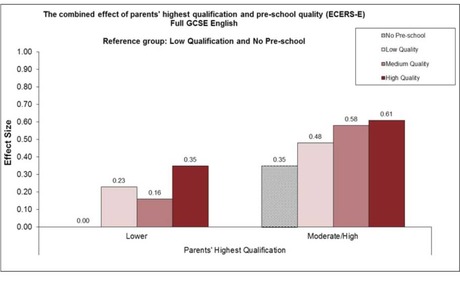Brenda Taggart, Edward Melhuish, Pam Sammons and Iram Siraj explain.

On 9 September the latest report from the Effective Pre-school, Primary and Secondary Education Project (EPPSE 3-16+) was launched by the new Parliamentary Under Secretary of State for Childcare and Education, Sam Gyimah. The report, entitled Students' Educational and Developmental Outcomes at Age 16, focuses on more than 2,500 young people who entered the EPPE study when they were aged three to five and have now completed compulsory education.
Some have remained in further study while others are working or NEET (not in education, employment or training). The report tells not only where they are now but how their early experiences have shaped the young people they have become.
BACKGROUND AND AIMS
The report marks the end of the current phase of the DfE-funded EPPSE project. Since 1997 the study has investigated the academic and social-behavioural outcomes in some 3,000 children, recruited at the age of 3+ years, drawn from around the country and representing diverse social and cultural backgrounds.
This latest report outlines the relationships between student outcomes at age 16 and a range of individual student, family, home learning environment, pre-school, primary and secondary school characteristics. It reports on:
- GCSE exam results
- four social-behavioural domains (self-regulation, pro-social, anti-social behaviour and hyperactivity)
- students' dispositions and self concept, mental well-being and engagement in risky behaviours
- likely economic returns from society's investment in early education.
ENDURING LEGACY
The report shows that pre-school continues to influence the outcomes of young people, most specifically:
- pre-school attendance (going or not), predicted higher total GCSE scores, higher grades in GCSE English and maths, and achieving five or more GCSEs at grade A*-C. The number of months spent in pre-school (duration) predicted higher total GCSE scores and grades in English and maths
- the quality of pre-school predicted both total GCSE scores and English and maths grades. High quality was also linked to better self-regulation, pro-social behaviour and lower levels of hyperactivity. The quality of pre-school was especially important for children whose parents had low qualifications
- attending pre-school, experiencing a longer duration, or attending settings of higher quality all predicted a greater likelihood of following an academic pathway (4+ A/AS levels) post 16 as well as a reduced likelihood of taking a lower academic route.
THE ECONOMIC VALUE
An economic analysis of the EPPSE data by a team at the Institute for Fiscal Studies used GCSE scores to predict future lifetime earnings. These analyses provide estimates of some of the likely future economic returns from society's investment in early education and add further to the empirical argument in favour of pre-school attendance and high-quality provision. The analyses showed that:
- attending a pre-school (vs no pre-school) had a positive influence on educational attainment at age 16 and this in turn predicts future lifetime gross earnings and has positive benefits to the Exchequer over lifetime earnings
- attending a pre-school (vs no pre-school) was associated with an estimated benefit of £26,788 for an individual and £35,993 for an average household. When this was calculated in terms of likely lifetime benefits to the Exchequer it translated into an estimated benefit of £15,914 (per household). Attending a pre-school of high vs low quality also had financial consequences for gross lifetime earnings for individuals (£12,335), for households (£18,820), and benefits to the Exchequer of £8,090 (per household).

FAMILY INFLUENCES
While pre-school had many positive benefits the research showed, consistent with findings from earlier phases of the research (EPPE and EPPE 3-11), that the family still has a major influence on student's results at age 16. For instance:
- family characteristics were strong predicators of exam success, with the strongest influence exerted by parental qualification levels on total GCSE scores. Although socio-economic status (SES) and family income were also important, their influence on academic results was weaker than parental education. In contrast, SES was one of the strongest predictors of all four social-behavioural outcomes
- students from less well-off families (eligible for free school meals) had lower full GCSE grades in English and maths
- neighbourhood disadvantage predicted lower GCSE scores and poorer development in self-regulation and pro-social behaviour
- family members were the main source of advice for students making post-16 choices. When parents encouraged their children to engage in learning outside school, their children had better outcomes.
Most specifically:
- the early years Home Learning Environment (HLE) continued to have a positive effect on academic outcomes, although this was weaker than when the children were younger
- academic enrichment activities (during early teenage years) also predicted better total GCSE scores and better self-regulation, pro-social behaviour and reductions in hyperactivity and anti-social behaviour. Academic enrichment activities also predicted higher scores for mental well-being at age 16.
During its 17 years, EPPSE has identified the positive role of pre-school education and the continuing contribution of pre-school quality to sound development, particularly for children whose parents had low qualifications. A key finding in this newest EPPSE report is the likely return to society of investment in early education.
This piece summarises the main findings from a long composite report on the research (Sylva et al, 2014) and several technical papers that cover the EPPSE students outcomes for academic achievement and progress, social-behavioural development, dispositions and well-being, views of school and post-16 destinations.
K Sylva and P Sammons, University of Oxford; B Taggart and I Siraj, Institute of Education, University of London; E Melhuish, Birkbeck University of London and University of Oxford
MORE INFORMATION
Students' Educational and Developmental Outcomes at Age 16 by K Sylva, E Melhuish, P Sammons, I Siraj and B Taggart (2014) for The Effective Pre-school, Primary and Secondary Education Project (EPPSE 3-16+), DfE RR 354, see www.gov.uk/government/publications/influences-on-students-development-at-age-16 or www.ioe.ac.uk/eppse.









